2006 PONTIAC GRAND PRIX towing
[x] Cancel search: towingPage 301 of 472
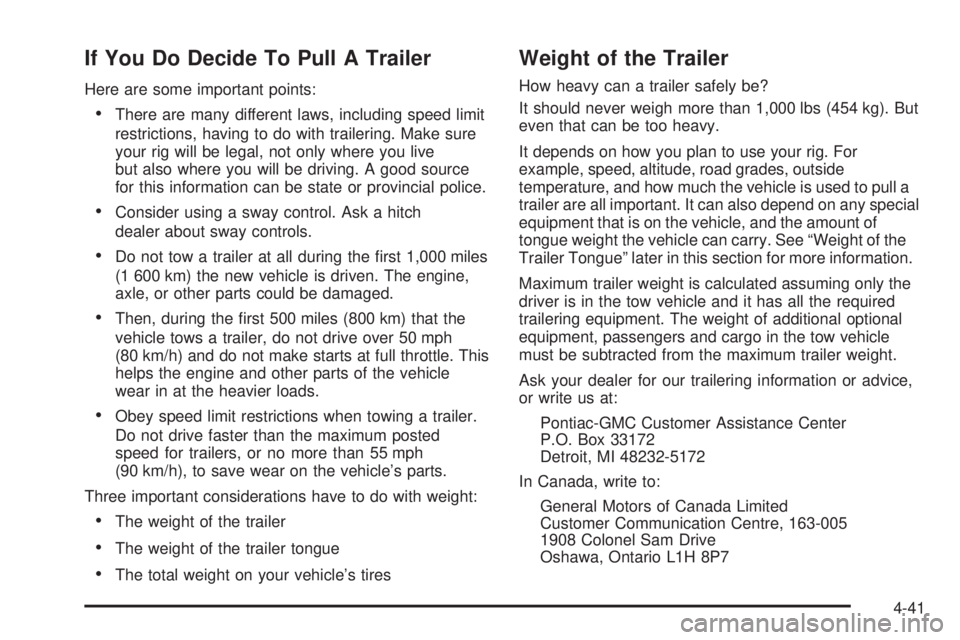
If You Do Decide To Pull A Trailer
Here are some important points:
There are many different laws, including speed limit
restrictions, having to do with trailering. Make sure
your rig will be legal, not only where you live
but also where you will be driving. A good source
for this information can be state or provincial police.
Consider using a sway control. Ask a hitch
dealer about sway controls.
Do not tow a trailer at all during the �rst 1,000 miles
(1 600 km) the new vehicle is driven. The engine,
axle, or other parts could be damaged.
Then, during the �rst 500 miles (800 km) that the
vehicle tows a trailer, do not drive over 50 mph
(80 km/h) and do not make starts at full throttle. This
helps the engine and other parts of the vehicle
wear in at the heavier loads.
Obey speed limit restrictions when towing a trailer.
Do not drive faster than the maximum posted
speed for trailers, or no more than 55 mph
(90 km/h), to save wear on the vehicle’s parts.
Three important considerations have to do with weight:
The weight of the trailer
The weight of the trailer tongue
The total weight on your vehicle’s tires
Weight of the Trailer
How heavy can a trailer safely be?
It should never weigh more than 1,000 lbs (454 kg). But
even that can be too heavy.
It depends on how you plan to use your rig. For
example, speed, altitude, road grades, outside
temperature, and how much the vehicle is used to pull a
trailer are all important. It can also depend on any special
equipment that is on the vehicle, and the amount of
tongue weight the vehicle can carry. See “Weight of the
Trailer Tongue” later in this section for more information.
Maximum trailer weight is calculated assuming only the
driver is in the tow vehicle and it has all the required
trailering equipment. The weight of additional optional
equipment, passengers and cargo in the tow vehicle
must be subtracted from the maximum trailer weight.
Ask your dealer for our trailering information or advice,
or write us at:
Pontiac-GMC Customer Assistance Center
P.O. Box 33172
Detroit, MI 48232-5172
In Canada, write to:
General Motors of Canada Limited
Customer Communication Centre, 163-005
1908 Colonel Sam Drive
Oshawa, Ontario L1H 8P7
4-41
Page 302 of 472

Weight of the Trailer Tongue
The tongue load (A) of any trailer is an important weight
to measure because it affects the total or gross weight
of the vehicle. The Gross Vehicle Weight (GVW)
includes the curb weight of the vehicle, any cargo in it,
and the people who will be riding in the vehicle. If
there are a lot of options, equipment, passengers and
cargo in the vehicle, it will reduce the tongue weight the
vehicle can carry, which will also reduce the trailer
weight the vehicle can tow. And if towing a trailer, the
tongue load must be added to the GVW because
the vehicle will be carrying that weight, too. SeeLoading
Your Vehicle on page 4-33for more information about
your vehicle’s maximum load capacity.When using a weight-carrying hitch or a
weight-distributing hitch, the trailer tongue (A) should
weigh 10 to 15 percent of the total loaded trailer
weight (B).
After the trailer is loaded, weigh the trailer and then the
tongue, separately, to see if the weights are proper.
The correct weight could be achieved simply by moving
some items around in the trailer.
4-42
Page 303 of 472
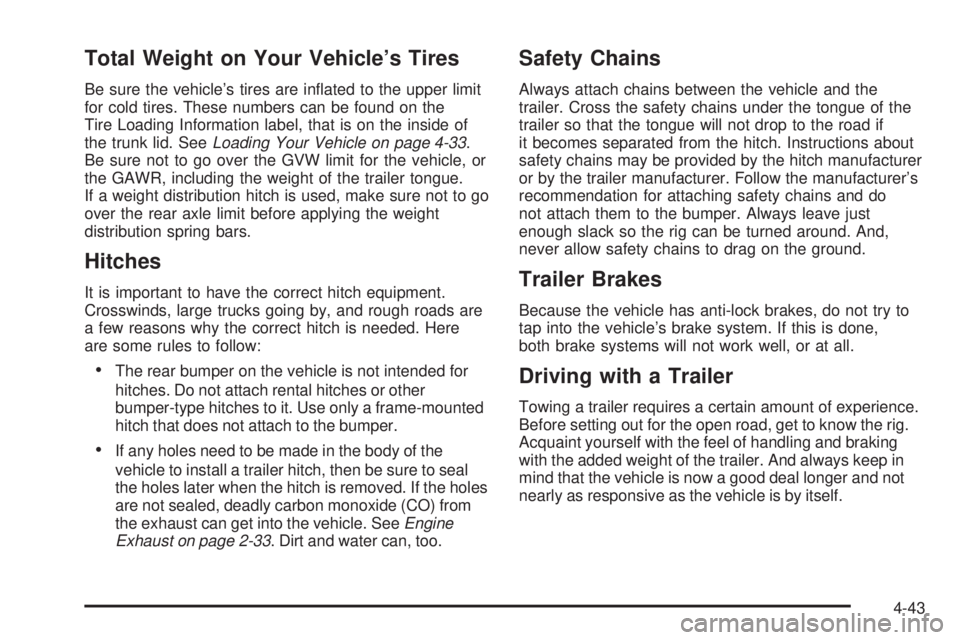
Total Weight on Your Vehicle’s Tires
Be sure the vehicle’s tires are in�ated to the upper limit
for cold tires. These numbers can be found on the
Tire Loading Information label, that is on the inside of
the trunk lid. SeeLoading Your Vehicle on page 4-33.
Be sure not to go over the GVW limit for the vehicle, or
the GAWR, including the weight of the trailer tongue.
If a weight distribution hitch is used, make sure not to go
over the rear axle limit before applying the weight
distribution spring bars.
Hitches
It is important to have the correct hitch equipment.
Crosswinds, large trucks going by, and rough roads are
a few reasons why the correct hitch is needed. Here
are some rules to follow:
The rear bumper on the vehicle is not intended for
hitches. Do not attach rental hitches or other
bumper-type hitches to it. Use only a frame-mounted
hitch that does not attach to the bumper.
If any holes need to be made in the body of the
vehicle to install a trailer hitch, then be sure to seal
the holes later when the hitch is removed. If the holes
are not sealed, deadly carbon monoxide (CO) from
the exhaust can get into the vehicle. SeeEngine
Exhaust on page 2-33. Dirt and water can, too.
Safety Chains
Always attach chains between the vehicle and the
trailer. Cross the safety chains under the tongue of the
trailer so that the tongue will not drop to the road if
it becomes separated from the hitch. Instructions about
safety chains may be provided by the hitch manufacturer
or by the trailer manufacturer. Follow the manufacturer’s
recommendation for attaching safety chains and do
not attach them to the bumper. Always leave just
enough slack so the rig can be turned around. And,
never allow safety chains to drag on the ground.
Trailer Brakes
Because the vehicle has anti-lock brakes, do not try to
tap into the vehicle’s brake system. If this is done,
both brake systems will not work well, or at all.
Driving with a Trailer
Towing a trailer requires a certain amount of experience.
Before setting out for the open road, get to know the rig.
Acquaint yourself with the feel of handling and braking
with the added weight of the trailer. And always keep in
mind that the vehicle is now a good deal longer and not
nearly as responsive as the vehicle is by itself.
4-43
Page 304 of 472
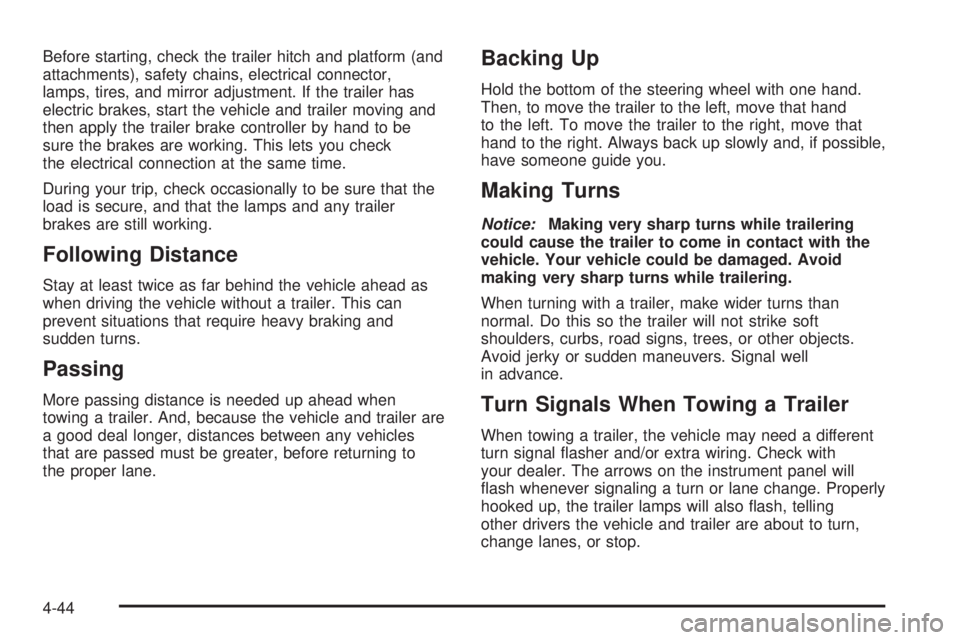
Before starting, check the trailer hitch and platform (and
attachments), safety chains, electrical connector,
lamps, tires, and mirror adjustment. If the trailer has
electric brakes, start the vehicle and trailer moving and
then apply the trailer brake controller by hand to be
sure the brakes are working. This lets you check
the electrical connection at the same time.
During your trip, check occasionally to be sure that the
load is secure, and that the lamps and any trailer
brakes are still working.
Following Distance
Stay at least twice as far behind the vehicle ahead as
when driving the vehicle without a trailer. This can
prevent situations that require heavy braking and
sudden turns.
Passing
More passing distance is needed up ahead when
towing a trailer. And, because the vehicle and trailer are
a good deal longer, distances between any vehicles
that are passed must be greater, before returning to
the proper lane.
Backing Up
Hold the bottom of the steering wheel with one hand.
Then, to move the trailer to the left, move that hand
to the left. To move the trailer to the right, move that
hand to the right. Always back up slowly and, if possible,
have someone guide you.
Making Turns
Notice:Making very sharp turns while trailering
could cause the trailer to come in contact with the
vehicle. Your vehicle could be damaged. Avoid
making very sharp turns while trailering.
When turning with a trailer, make wider turns than
normal. Do this so the trailer will not strike soft
shoulders, curbs, road signs, trees, or other objects.
Avoid jerky or sudden maneuvers. Signal well
in advance.
Turn Signals When Towing a Trailer
When towing a trailer, the vehicle may need a different
turn signal �asher and/or extra wiring. Check with
your dealer. The arrows on the instrument panel will
�ash whenever signaling a turn or lane change. Properly
hooked up, the trailer lamps will also �ash, telling
other drivers the vehicle and trailer are about to turn,
change lanes, or stop.
4-44
Page 305 of 472
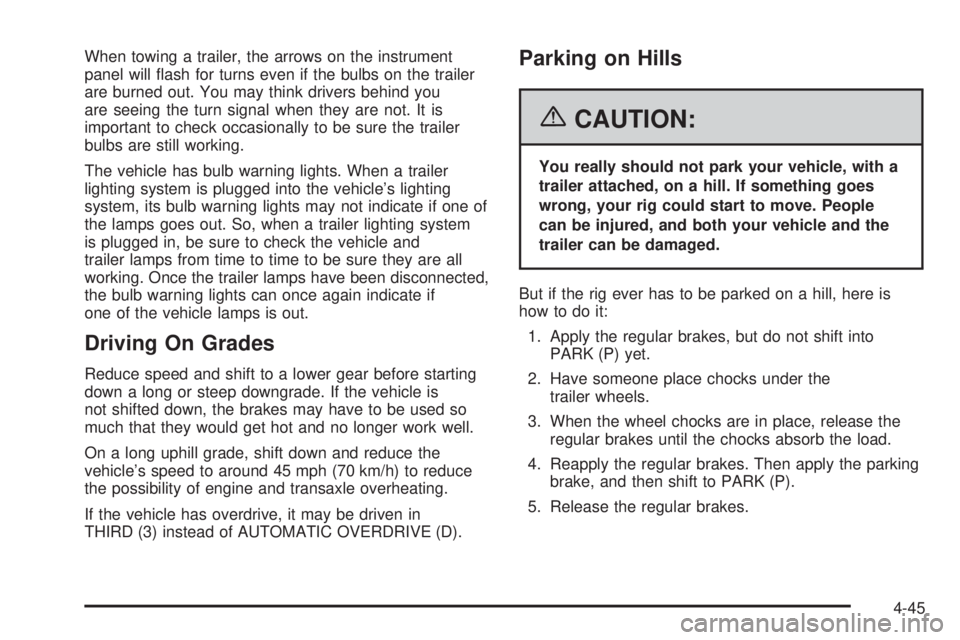
When towing a trailer, the arrows on the instrument
panel will �ash for turns even if the bulbs on the trailer
are burned out. You may think drivers behind you
are seeing the turn signal when they are not. It is
important to check occasionally to be sure the trailer
bulbs are still working.
The vehicle has bulb warning lights. When a trailer
lighting system is plugged into the vehicle’s lighting
system, its bulb warning lights may not indicate if one of
the lamps goes out. So, when a trailer lighting system
is plugged in, be sure to check the vehicle and
trailer lamps from time to time to be sure they are all
working. Once the trailer lamps have been disconnected,
the bulb warning lights can once again indicate if
one of the vehicle lamps is out.
Driving On Grades
Reduce speed and shift to a lower gear before starting
down a long or steep downgrade. If the vehicle is
not shifted down, the brakes may have to be used so
much that they would get hot and no longer work well.
On a long uphill grade, shift down and reduce the
vehicle’s speed to around 45 mph (70 km/h) to reduce
the possibility of engine and transaxle overheating.
If the vehicle has overdrive, it may be driven in
THIRD (3) instead of AUTOMATIC OVERDRIVE (D).
Parking on Hills
{CAUTION:
You really should not park your vehicle, with a
trailer attached, on a hill. If something goes
wrong, your rig could start to move. People
can be injured, and both your vehicle and the
trailer can be damaged.
But if the rig ever has to be parked on a hill, here is
how to do it:
1. Apply the regular brakes, but do not shift into
PARK (P) yet.
2. Have someone place chocks under the
trailer wheels.
3. When the wheel chocks are in place, release the
regular brakes until the chocks absorb the load.
4. Reapply the regular brakes. Then apply the parking
brake, and then shift to PARK (P).
5. Release the regular brakes.
4-45
Page 306 of 472
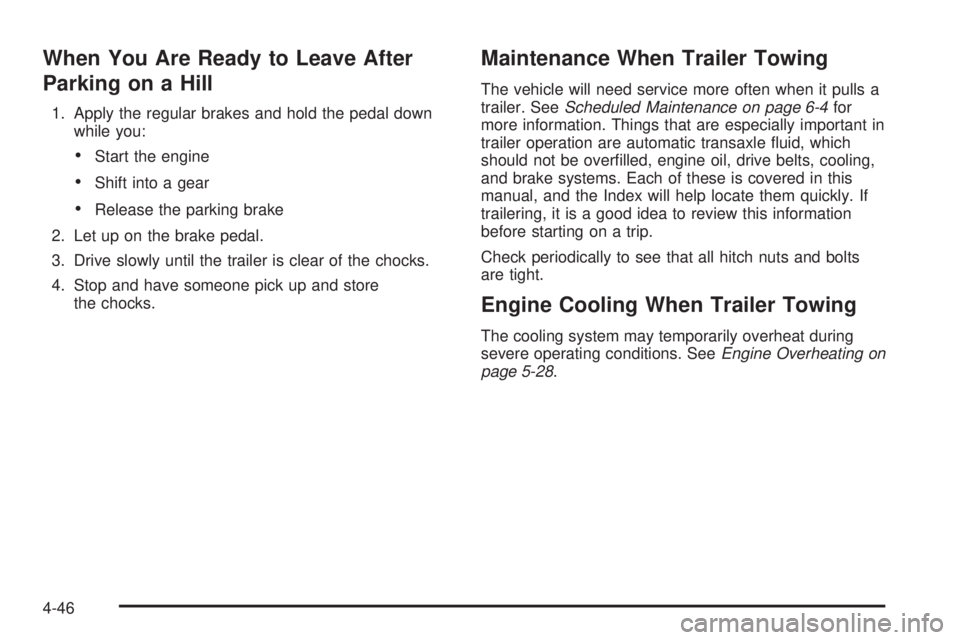
When You Are Ready to Leave After
Parking on a Hill
1. Apply the regular brakes and hold the pedal down
while you:
Start the engine
Shift into a gear
Release the parking brake
2. Let up on the brake pedal.
3. Drive slowly until the trailer is clear of the chocks.
4. Stop and have someone pick up and store
the chocks.
Maintenance When Trailer Towing
The vehicle will need service more often when it pulls a
trailer. SeeScheduled Maintenance on page 6-4for
more information. Things that are especially important in
trailer operation are automatic transaxle �uid, which
should not be over�lled, engine oil, drive belts, cooling,
and brake systems. Each of these is covered in this
manual, and the Index will help locate them quickly. If
trailering, it is a good idea to review this information
before starting on a trip.
Check periodically to see that all hitch nuts and bolts
are tight.
Engine Cooling When Trailer Towing
The cooling system may temporarily overheat during
severe operating conditions. SeeEngine Overheating on
page 5-28.
4-46
Page 336 of 472
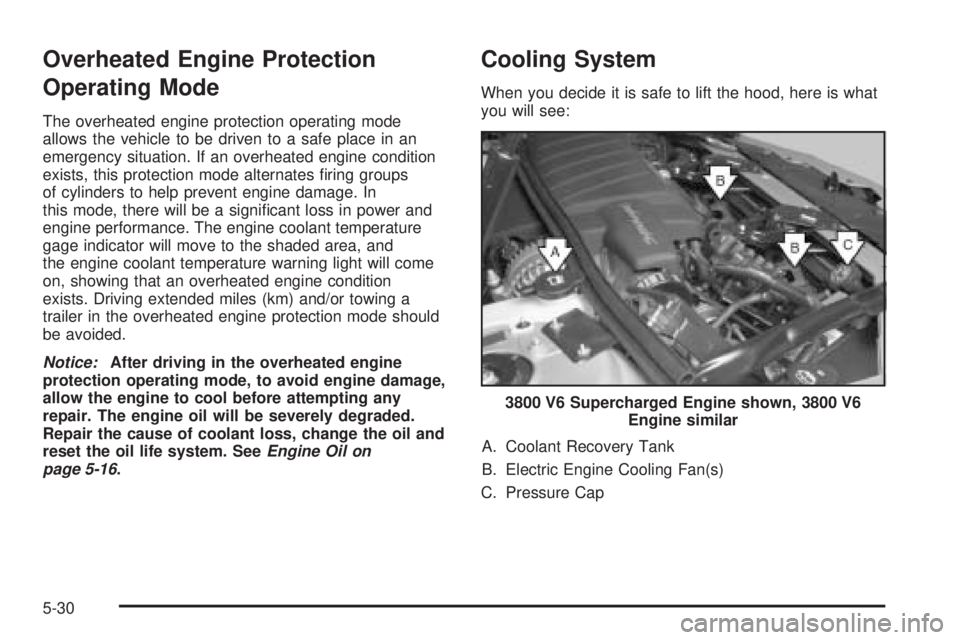
Overheated Engine Protection
Operating Mode
The overheated engine protection operating mode
allows the vehicle to be driven to a safe place in an
emergency situation. If an overheated engine condition
exists, this protection mode alternates �ring groups
of cylinders to help prevent engine damage. In
this mode, there will be a signi�cant loss in power and
engine performance. The engine coolant temperature
gage indicator will move to the shaded area, and
the engine coolant temperature warning light will come
on, showing that an overheated engine condition
exists. Driving extended miles (km) and/or towing a
trailer in the overheated engine protection mode should
be avoided.
Notice:After driving in the overheated engine
protection operating mode, to avoid engine damage,
allow the engine to cool before attempting any
repair. The engine oil will be severely degraded.
Repair the cause of coolant loss, change the oil and
reset the oil life system. SeeEngine Oil on
page 5-16.
Cooling System
When you decide it is safe to lift the hood, here is what
you will see:
A. Coolant Recovery Tank
B. Electric Engine Cooling Fan(s)
C. Pressure Cap3800 V6 Supercharged Engine shown, 3800 V6
Engine similar
5-30
Page 434 of 472
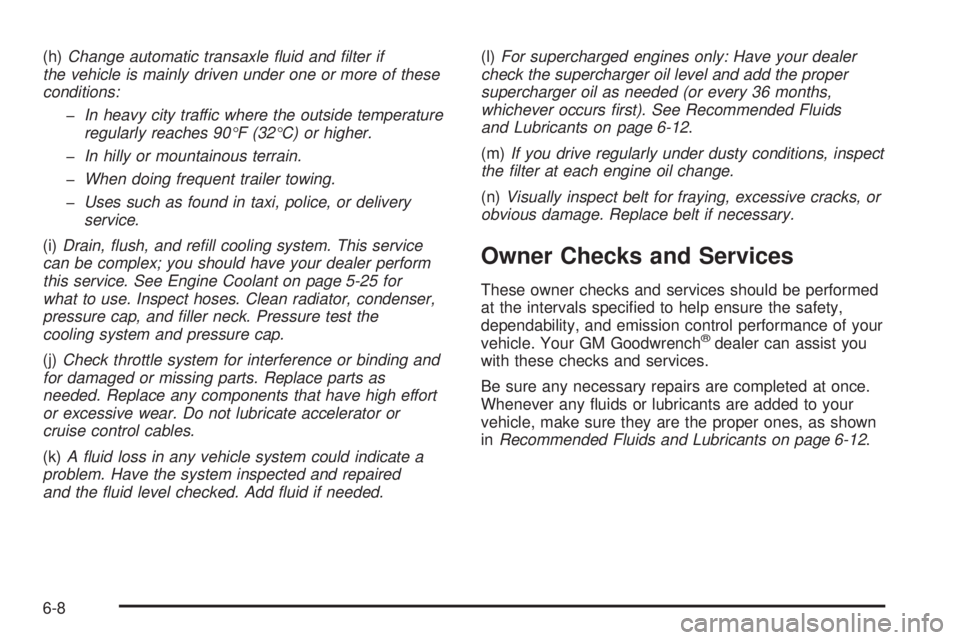
(h)Change automatic transaxle �uid and �lter if
the vehicle is mainly driven under one or more of these
conditions:
�In heavy city traffic where the outside temperature
regularly reaches 90°F (32°C) or higher.
�In hilly or mountainous terrain.
�When doing frequent trailer towing.
�Uses such as found in taxi, police, or delivery
service.
(i)Drain, �ush, and re�ll cooling system. This service
can be complex; you should have your dealer perform
this service. See Engine Coolant on page 5-25 for
what to use. Inspect hoses. Clean radiator, condenser,
pressure cap, and �ller neck. Pressure test the
cooling system and pressure cap.
(j)Check throttle system for interference or binding and
for damaged or missing parts. Replace parts as
needed. Replace any components that have high effort
or excessive wear. Do not lubricate accelerator or
cruise control cables.
(k)A �uid loss in any vehicle system could indicate a
problem. Have the system inspected and repaired
and the �uid level checked. Add �uid if needed.(l)For supercharged engines only: Have your dealer
check the supercharger oil level and add the proper
supercharger oil as needed (or every 36 months,
whichever occurs �rst). See Recommended Fluids
and Lubricants on page 6-12.
(m)If you drive regularly under dusty conditions, inspect
the �lter at each engine oil change.
(n)Visually inspect belt for fraying, excessive cracks, or
obvious damage. Replace belt if necessary.
Owner Checks and Services
These owner checks and services should be performed
at the intervals speci�ed to help ensure the safety,
dependability, and emission control performance of your
vehicle. Your GM Goodwrench
®dealer can assist you
with these checks and services.
Be sure any necessary repairs are completed at once.
Whenever any �uids or lubricants are added to your
vehicle, make sure they are the proper ones, as shown
inRecommended Fluids and Lubricants on page 6-12.
6-8